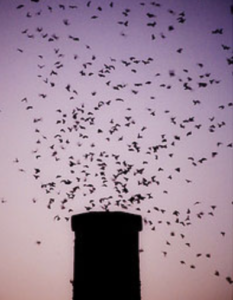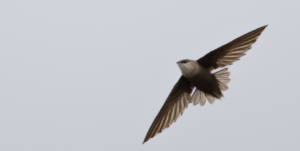What are Chimney Swifts? Why are they important?
Chimney Swifts are birds that spend nearly all their waking hours flying as they forage for insects in the sky and are a major predator of mosquitoes. They cannot perch like most birds and instead cling to vertical surfaces, so they need surfaces for roosting and nesting. They use open cavities in trees or older chimneys, but with those now being replaced or capped, they are losing those spaces. Their populations have dropped significantly since the 1960s and the loss of nesting/roosting habitat is a contributor to the decline.
In conjunction with West Cook Wild Ones and Park District of Oak Park, Girl Scout Troop 47184 is constructing a Chimney Swift Tower in one of the PDOP park locations.
How can I help their project?
We are in need of community assistance in locating the best park location for one of these towers. Please complete this form each time you have sighted a Chimney Swift in your area to help our tracking efforts. We appreciate any and all assistance as we help construct a tower to provide a safe area for them to roost and nest.
How can I help Chimney Swifts?
- Participate in documenting sightings of them on the Google Form.
- Chimney Swifts are insectivores who rely on what is called “arial plankton.” They eat mosquitoes, gnats, all kinds of flies, pretty much any small insect that flies up in the air.
- Do not use pesticides. Pesticides will kill the larvae and the adults.
- Do not use Mosquito Spraying companies. See here for a more effective approach recommended by Dr. Doug Tallamy (entomologist): Mosquito Larva Trap
- Please keep leaf litter in your gardens, under trees and shrubs. This leaf litter will support the larvae of many of the gnats and flies that will become food for the Chimney Swifts. (Hummingbirds also need a lot of those types of insects too.)
- If you do not need to cap your chimney, consider leaving it uncapped in case Chimney Swifts might be able to use it.
- If you need to clean your chimney, consider waiting until the fall when Chimney Swifts have left the area.

How can I learn more about Chimney Swifts?
- Basic Information about their lives, and you can view video and audio to help with identification. They. have distinctive flight patterns and calls: All About Birds.
- Facebook Group: Chimney Swifts over Fox Valley and Beyond


